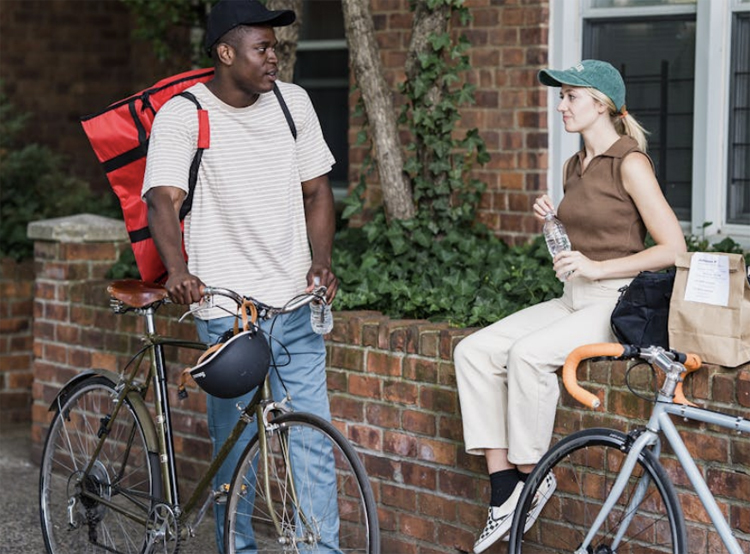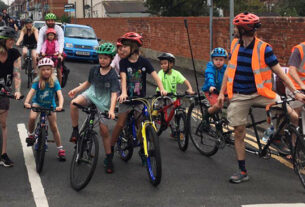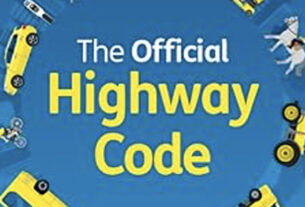Matt Touw runs a bike repair business called MT-Cycle Repairs out of a workshop just off the Wokingham Road in East Reading. He is well known among delivery riders as he is one of a very few people who will work on their bikes, as he has a very real concern for their safety and welfare. This has arisen from his own experience of doing the work and being one of them.
After he gave a fascinating talk to the RCC open meeting in April, we decided to use this newsletter to look in more depth at the issues he raised, and to that end I went and had a long talk to him about his own experiences and his ideas for how things could be improved.
Matt has been involved with cycling in one way or another for most of his life, having worked for most of the major bike shops before making a career in retailing. It was while he was working in Reading for a major town centre retailer, he started doing cycle delivery work in his spare time to supplement his income.
For instance, he would go to Oxford on his free weekends, where he could earn better rates than here in Reading. As a result of this he has a pretty comprehensive knowledge of the various delivery companies and the way their online apps work.
COVID-19 changed everything for him as the retail sector was hit, so he opened his bike repair shop on Norris Road, which now has a wide clientele among the locals as well as the delivery rider community. He is also a regular at cycling events where he uses his skills and experience to do free instant fixes.
He first explained to me how people get into the system and how the various apps work. There are just a few major players in the field, Deliveroo, Uber, Just Eat and Amazon, and they all have their own apps which work in the same general way but have their own subtle differences.
Riders will sign up via the company’s website and register an interest in working in a particular geographic area. Their personal details will be checked to make sure they have a right to work in the UK and that they have no relevant criminal convictions. The system also checks to see if there is a need for more riders in that area and they will not take on riders in areas that are already very popular e.g. Central Reading.
If these checks are passed, the rider is able to log onto the app and start accepting jobs. And here the apps vary a bit. The Just Eat app will only allow you to work in the area you have specified initially, whereas Deliveroo and Uber allow you to change your preferred area afterwards.
This leads to the first oddity in the system. If you are refused one area, you can apply for another less popular one and then switch, which can lead to too many riders chasing too few orders.
Although the companies are not meant to take on more riders when an area is saturated, they do so during busy periods and will often take new applicants rather than ones on the waiting list. So it becomes a bit of a lottery and potentially means less orders per rider.
There is also a confusion over substitution of riders. Some apps allow this but there is a black market where riders, who are legally allowed to work, sell access to their accounts to others such as immigrants and asylum seekers. At present there is very little checking done to ensure that the rider is who he says he is.
All these consideration lead to considerable problems for the riders, in addition to which they have to cope with traffic and bike problems, especially tyre and brake pad wear due to the weight of the bikes and the loads to be carried and, of course, the state of the roads.
In addition, they are expected to pay for the company’s merchandise, such as the insulated back packs and company clothing. There is, however, nothing to stop a Deliveroo rider taking orders from Just Eat or Uber. Some riders are able to combine orders to get several fees from one delivery ride.
It will come as no surprise to find that virtually all delivery riders are using e-bikes and most of them have been modified beyond what the current rules allow. These specify that a bike can only have a motor that has a continuous input of no more than 250W, and have the motor only as an assistant to assist you up to 25kph.
These rules are common to all EU countries (and Ex-EU), and in the UK to be exempt from licensing and other motorcycle-related regulations, it needs to be no more than 30 kg. Also, riders must be at least 14 years of age to be eligible to ride an e-bike.
But all this comes at a cost in terms of safety for the riders and other road users and the public image of the delivery rider is not very favourable. Here is an extract from an article on the welovecycling website about e-bikes in general.
Firstly, due to the lack of license and registration needed, anyone can take off and fly down a public road at motorcycle speed. It’s not a rare view to see someone speeding down a sidewalk, slaloming between pedestrians as if they were cones. This presents a significant risk.
There are also quite enough people who ride an e-bike while texting. As absurd as that is, the capability of these bikes to run as fast as 25kph should be terrifying enough.
Moreover, some don’t know or entirely disregard road rules set to keep everyone safe. As a result e-bikers run red lights with astonishing speeds. And while the same might be true for regular cyclists, at least those who don’t respect the law usually can’t reach such high speeds.
Another serious issue are the injuries inflicted by crashing with an e-bike. Research done by the National Institutes of Health (NIH) suggests that accidents with an e-bike have more severe consequences than with a regular bike.
Head trauma is significantly higher, although a helmet is much more frequently used. The main culprit behind these results, according to the experts, is the much higher speed.
As you can see there are big problems to be addressed, and Matt has thought about this in some detail. In terms of safety, he would like to see all cycle shops with repair facilities to be able to service the bikes.
This may require the user signing a liability waiver, but he is concerned that too many of the bikes are in a dangerous condition and getting them fixed is a high priority. The extra weight penalty of the battery imposes extra stress on brakes and tyres beyond what would be expected.
He would also like to see the regulations changed to allow higher powered bikes and a higher speed limit than the current 15mph. His logic is that being able to keep up with the traffic flow at, say 25mph, would be beneficial to all users.
Although this may prove controversial, there were reports that the last government were considering changing the rules. I have not been able yet to find out what Labour’s position is on this.
Matt’s view on policing is that there should be a lot more active policing of the bikes and the standards of riding, but he accepts that under the current conditions they do not have the capacity to do much more than confiscate the odd bike.
He would like to see more reporting of anti-social and dangerous riding by the general public, and thinks that the delivery companies should be forced to take some responsibility for the behaviour of the riders they are contracting, if not employing, to carry out their deliveries.
They should be made to put in place systems that ensure the rider is actually the one registered and not an illegal substitution. This might require the rider posting a selfie for each shift or maybe even each delivery.
These last measures may also require a change in the laws governing self-employment and sub-contracting and early indications are that this new government might be persuaded in this direction.
Matt thinks that if refugees and asylum seekers were allowed to work while their claims were being processed, there would be less of an incentive to use the black market, and being able to earn a living legally, could reduce the burden they place on the welfare bill.
In summary, a system has evolved where due to the fact that delivery companies hold all the cards in terms of who gets what work at what price, the riders have had to find all sorts of dubious and often illegal routes to make even a modest living.
For many of these riders it is the only work that they are able to find due to all manner of problems, be they educational, social or legal status. However, at the end of the day, the system only works if ordinary people are prepared to order their food or groceries on-line and pay for the privilege of having it delivered.
Joe Edwards
RCC Chairman



